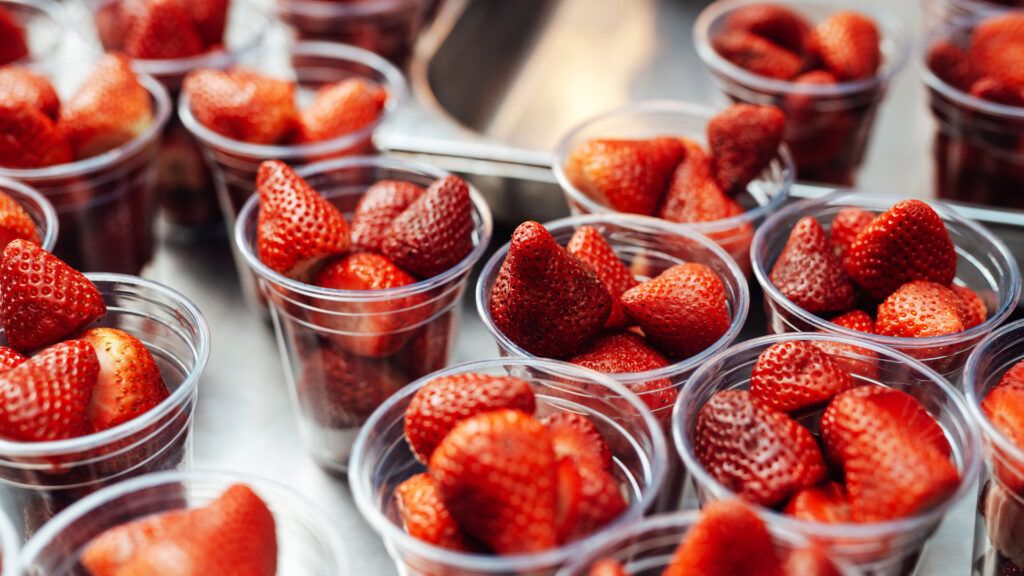 Share on Pinterest
Share on Pinterest- Strawberries eaten in middle age can protect against cognitive decline and depression later on, according to a new randomized, controlled study.
- The study involved middle-aged people with overweight and insulin resistance who described themselves as experiencing mild cognitive decline.
- The study’s authors suggest that anthocyanins, bioactive compounds in strawberries, blueberries, and other berries, may be the neuroprotective agent at work.
- While endorsing strawberries as a healthy food, a neurologist was skeptical of the study’s findings.
Middle-aged adults with overweight and insulin resistance who consumed strawberries for 12 weeks reported a reduction in memory interference and depression, according to a new study.
With cognitive disorders, such as Alzheimer’s disease, developing slowly over a period of years beginning in midlife, the study’s authors investigated a dietary change that may slow the progression of dementias and may increase mood.
The study focuses on anthocyanins, a nutritional compound strawberries contain. Previous research on blueberries — which also contain anthocyanins — by the study’s lead author suggested that the compound improved executive brain function.
The current study was a small randomized, double-blind, placebo-controlled trial. Five men and 25 women participated. They were split into two groups: one that consumed strawberries and one that received a placebo.
The researchers assessed individuals’ neurocognitive health and mood before the start of the 12-week trial.
During the trial, the experimental group was instructed to consume one packet of powder mixed with liquid, prepared from whole strawberries desiccated, freeze-dried, and milled. The strawberry packet contained the equivalent of one cup of whole fresh strawberries, established as a standard serving by the California Strawberry Commission, which funded the study.
The researchers formulated the placebo to have the same taste, appearance, and carbohydrate load as the strawberry powder.
Neither group consumed other berries during the trial period to avoid influencing the study’s findings since other such fruits may have neuroprotective compounds of their own.
The primary effects measured by the authors of the study after the trial period were participants’ frequency of “intrusion errors” and self-reported mood. Intrusion errors describe the repeating or remembering of words that were not included in a word-learning task.
The researchers observed fewer intrusion errors after the study and a lower incidence of depression after the trial.
The study was published in Nutrients.
Michelle Routhenstein, RD, CDE, CDN, a preventive cardiology dietitian who was not involved in the study, described strawberries this way:
“Strawberries are rich in anthocyanins, which make them potentially good for cognitive and emotional health. Anthocyanins are what give strawberries their red pigment. Anthocyanins are a potent antioxidant that has anti-neuroinflammatory properties, which benefit brain and emotional health.”
Routhenstein noted that other fruits also contain anthocyanins, such as blueberries, blackberries, bilberries, black currants, and mulberries.
For many, the only strawberries available during much of the year are frozen.
This should not be a concern, according to Routhenstein:
“Frozen strawberries are as nutritious as fresh strawberries, and oftentimes may be tastier and more convenient to consume given their seasonal nature. It is best to thaw them naturally, like in the refrigerator overnight, to avoid destroying the vitamin C content when it is exposed to heat, such as when microwaving.”
The study’s authors hypothesize that the benefit of strawberries’ anthocyanins lies in their anti-inflammatory nature and that this reduction in inflammation and a decrease in oxidative stress may be protective against cognitive decline.
Neurologist Dr. Clifford Segil was skeptical: “It’s very hard as a clinical neurologist to say that food that’s going to be anti-inflammatory is going to protect you from memory loss.” This is “because we give people Motrin, Advil, and Alleve, which are anti-inflammatory medications.”
“If those don’t protect you against memory loss, how is a smart anti-inflammatory food going to affect you?”
“Strawberries sounds nice.” Dr. Segil added. “But it’s challenging to say that it would be neuroprotective.”
Dr. Segil said that studies such as this cross his desk all the time: “My favorite study to date has been one on syrups and how maple syrups are protective. My children love syrup, and I only wish it was neuroprotective.”
Nevertheless, there is some research that has found an association between strawberries and a reduced risk of Alzheimer’s disease’s characteristic tau tangles with the consumption of strawberries and their bioactive compound, pelargonidin.
Similarly, Dr. Segil hypothesizes that the beneficial effect of strawberries on mood has less to do with anthocyanins and more to do with something simpler.
Noting that the participants in the study had overweight, he proposed:
“Strawberries and these kinds of foods may decrease weight, and if people are eating healthier food, they may not be exposed to unhealthy foods, and that may increase patients feeling happy because they’re eating healthy.”
Dr. Segil added, “As a neurologist, I most commonly advise people to increase eating foods like strawberries and blueberries when patients are constipated, because it’s also a stool softener. So the most direct benefit that I clinically tell people to increase their berry intake for is for the softening of their stool, which can also have health benefits, but that is not a direct neurological benefit.”
